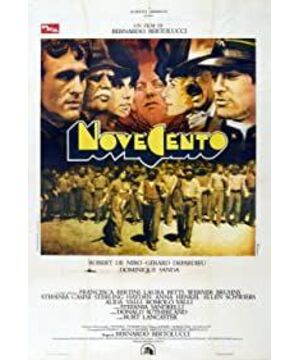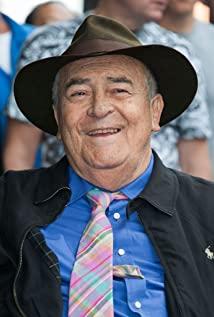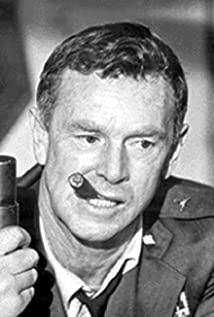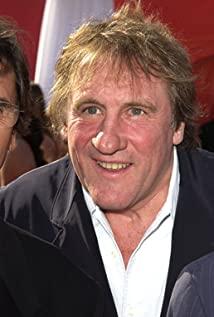This is a film directed by the famous Italian director Bertolucci in 1976. It tells the life of the people of Genoa, Italy, from the beginning of the last century to the end of World War II. The entire film is 5 hours and 15 minutes long, and it took two readings to make up my mind. The film is less a historical epic than a euphemistic lyric about how dramatic social changes at the beginning of the last century affected people's lives, thoughts and behaviors.
In 1901, the rich second generation Alfred and the poor second generation Olmer were born on the same day. Since childhood, we have been naughty and played together. But their fates were completely different. Alfdre took over as the farmer, and he was so arrogant. Olmau was a steadfast farmer and occasional pig butcher, and was actually the leader of the local socialist movement. There is also a third person here: Attila, the farm steward, a villain with ill-conceived intentions. In order to climb to the top, join the fascist party, and hook up with the niece of the farmer. After the fascist party came to power in Italy, it was even more unscrupulous, murdered and set fire, committed many evils, and finally received the retribution it deserved. Alfred and Olmau were, of course, enemies in their respective class positions, but at the same time good friends. Until the end of the film, the two were white-haired and staggering, and they were fighting back and forth together.
The film deliberately describes the changes in Italy's modern society. The Italian peasants in the 20th century were in a similar situation to the serfs. As Olmer said in the film, they locked them in the house at night, and asked the housekeeper to open the lock in the morning to work on the ground. At this time when the European socialist movement was in full swing, the old hunchback in the film said to everyone: "Everyone will support the great and fair new order established for the unfortunate peasants, people can support themselves and work only for themselves, not for the gentlemen. ." Under the influence of his ideology, in order to change this inhuman living condition, the farm workers prompted them to set up a "Workers' Union" to safeguard their rights and interests. We saw that during the workers' strike, the farmers in suits and leather shoes had to go down to the ground to harvest crops by themselves, which is ridiculous. And these rich people's fear of redness has allowed fascism to spread. Alfdred's attitude towards Attila is a reflection of this mentality. He backed down and even supported, so much so that he was dismissed as a "coward" by his wife. Attila said: "I don't want elegance, I want strength." Not only did he attack the poor, but even the rich were thrown aside, leaving only violence and evil. In the end, when Alfred finally saw the evil of fascism and decided to fire Attila, his wife had left him.
Alfred and Olmer have been good friends since childhood. When they were born, Alfred's grandfather said to Olmau's grandfather, "What must it mean to be born together?" Olmau's grandfather said, "It may mean that our children die together." The film describes the They have a complicated relationship that is constantly being rationalized and chaotic. As they grow up, they realize the difference between them. Despite their enduring friendship, each other's classes were hostile. They had a conversation.
Alfred: "Imagine my dad's face if he knew we were together?"
Olmer: "Your father? Your father is a thief. Who would crave respect as much as he does?"
Alfred: "I'll be meaner to you when I'm in charge of family affairs."
Olmer: "At that time, I will kill you!"
This is usually the case, because of a person's origin and the environment in which he lives, his thoughts, emotions and behaviors are largely imprinted with the imprint of the class to which he belongs. Neither Alfdre nor Olmau could be without exception. Only when they accept the new ideas of the times will they gradually look back at themselves and follow the trend of thought that represents the progress of mankind. Olmau did just that, from an ordinary peasant to the leader of the movement. Although Alfdre was different from his father's shamelessness, he also hoped to treat farmers with generosity like his grandfather, and he nostalgic about the good old days. He said: "I don't want to change, I want everyone to be the same, as always. All people reach out and put their hands together." Dissatisfied with Attila, dissatisfied with all the progress and regression, but can do nothing about all these changes. As a result, he almost took his own life.
There is an intriguing scene in the film. When the fascists set fire to the Progressive Society's house, they also burned the four old men there. Olmer and Anita lead the ox cart that transported the dead body, the charred body covered with red cloth, walking on the gravel road of the street, Olmer calling for people to come out to mourn the dead, empty road lined with houses The doors and windows were closed, no one answered, no one paid attention. At this point, Anita cried. Olmer reassured her: "No, no, we're going to be strong. We're the majority." This scene reminded me of a similar scene in the movie Let the Bullets Fly. Zhang Mazi threw money and guns in the county town, but no one responded. Except for a few wobbly geese, there was no one else on the street. It was not until Zhang Mazi killed the fake Huang Shilang that the people flocked to keep up.
In this age of undeveloped people, poor people also hope to change their fate, and this hope is often pinned on a savior who falls from the sky, or the violent actions of people who have nothing to do with them. Every individual of the people, with absolutely no regard for the long-term interests of their own class, is counting on making small profits, but is unwilling to take any risks. The pioneers could only sigh the numbness of the people like Lu Xun, but they were helpless. The solution is to use tricks like Zhang Mazi to trick the public to follow, or like Anita in the film, to educate the ignorant people for a long time. The effective method here is to first meet the immediate needs of the people, "it's really busy to clean up the golden pot and divide the fields." After this, long-term enlightenment is carried out.
At the end of the film, with the demise of fascism, people began the "Festival of Revolutionaries". Singing and laughing, the red flag fluttered. Do whatever you want with the Nazis. Even Alfred was sentenced to death. It wasn't until the authorities announced that they had handed over the weapons that people were honest. This is also said to be the beginning of post-war transformation in Italy. I have seen this kind of extreme frenzy among the rebels in the later Bingwu period, and recently in Hong Kong. As for the latter, I can't say that they are all SBs, I just think they are inferior to the Italian farmers at the beginning of the last century. The peasants had no culture, but they knew the legal system. Later, this group, who seemed to be all college students, had a very basic understanding of the world, and their IQ was even lower. It can be seen that enlightenment is a long and hard work. Pull away.
De Niro plays Alfred, and the inner torment, indecision, cynicism on the surface, and seemingly calm personality are very well expressed. Depardieu plays Olmau, still in love, although his nose is not as big as it was later. Young he and De Niro are both handsome and handsome.
The film reflects director Bertolucci's own ideological tendencies, and I am not qualified to judge what is right or wrong. But I believe the story he tells is true. He also faintly felt his nostalgia and nostalgia for the past. For example, there is such a scene in the film. On a winter night, Ada was invited to Olmer's poor home. She sighed and said, "It's so nice here." Olmer asked her, "I have to ask, how is it?" Ada replied, "Goodnight Anita, the smell of dinner, and your mother dozing off by the fire. The way you all get along together." It was warm to watch. Watching this movie makes us seem to hear the footsteps of history. Slow but firm.
The story of the film is structured through several scenes. Birth, strike, demobilization, town, dance, wedding, Christmas, massacre, victory. Many things happen in each individual scene, all described in great detail. The film also uses a lot of close-up shots, some of which are unclear, perhaps Bertolucci is showing the real images of farmers in the Italian countryside. The narrative is structured a bit like One Hundred Years of Solitude. In the film, there is a passage where Olmau's family of more than forty eats together. In a simple house, there is a long table and coarse benzene tableware, which is very similar to Borutel's "The Peasant's Wedding". The passage of the villagers dancing by the river is very similar to Manet's "Ball of the Woods". On the bank of the long winding river, in the sky-piercing poplar forest, a small band played Italian country songs, and groups of villagers danced cheerfully. . Very moving.
Friends who are interested in this movie should watch it at least twice.
My rating: 8.0.
View more about 1900 reviews











